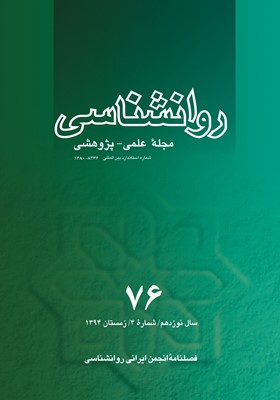رابطۀ باورهای هوشی با خودگردانی در یادگیری
محورهای موضوعی : Psychology
1 - دانشگاه پیام نور
کلید واژه: باورهای هوشی, اهداف پیشرفت, هیجان های تحصیلی, خودگردانی در یادگیری,
چکیده مقاله :
این پژوهش با هدف تعیین روابط باورهای هوشی و خودگردانی در یادگیری با توجه به نقش واسطه ای اهداف پیشرفت و هیجان های تحصیلی به روش تحليل مسير انجام شده است. برای اين منظور 322 نفر از دانشجویان مقطع کارشناسی ارشد دانشگاه پیام نور استان فارس به روش نمونه گيری طبقه ای نسبی انتخاب و به پرسشنامه خودگزارشی متشکل از خرده مقياس های باورهای هوشی، اهداف پيشرفت، هیجان های تحصیلی و خودگردانی در یادگیری پاسخ دادند. به طور كلی نتایج پژوهش حاکی از اثرات غیر مستقیم و متفاوت باور هوشی ذاتی و افزایشی بر خودگردانی در یادگیری می باشد. به طوری که باور هوشی افزایشی از طریق واسطه گری اهداف تبحری و هیجان های مثبت بر خودگردانی در یادگیری دارای اثر غیر مستقیم و مثبت و باور هوشی ذاتی از طریق واسطه گری اهداف اجتناب-عملکرد، اهداف رویکرد-عملکرد و هیجان های منفی بر خودگردانی در یادگیری دارای اثر غیر مستقیم و منفی می باشد.
The present study examined the relationships between beliefs about intelligence and automatic learning regarding the mediating role of achievement goals and academic emotions using path analysis.To fulfill this, goal 322 graduate students of Fars Payame Noor University were chosen through ratio stratified sampling, and then, answered to the Self-Report Questionnaire consisting of the Intelligence Beliefs, Questionnaire of Achievement Goals, the Questionnaire of Academic Emotions, and the Automatic Learning Subscales. The results showed the indirect and direct effects of entity and incremental intelligence beliefs on autonomy in learning. Incremental intelligence belief had indirect positive effect on autonomy in learning via the mediation of mastery goals and positive emotions. Moreover, innate intelligence belief had indirect negative effect on autonomy in learning through the mediation of performance-avoidance goals, performance-approach goals, and negative emotions.


